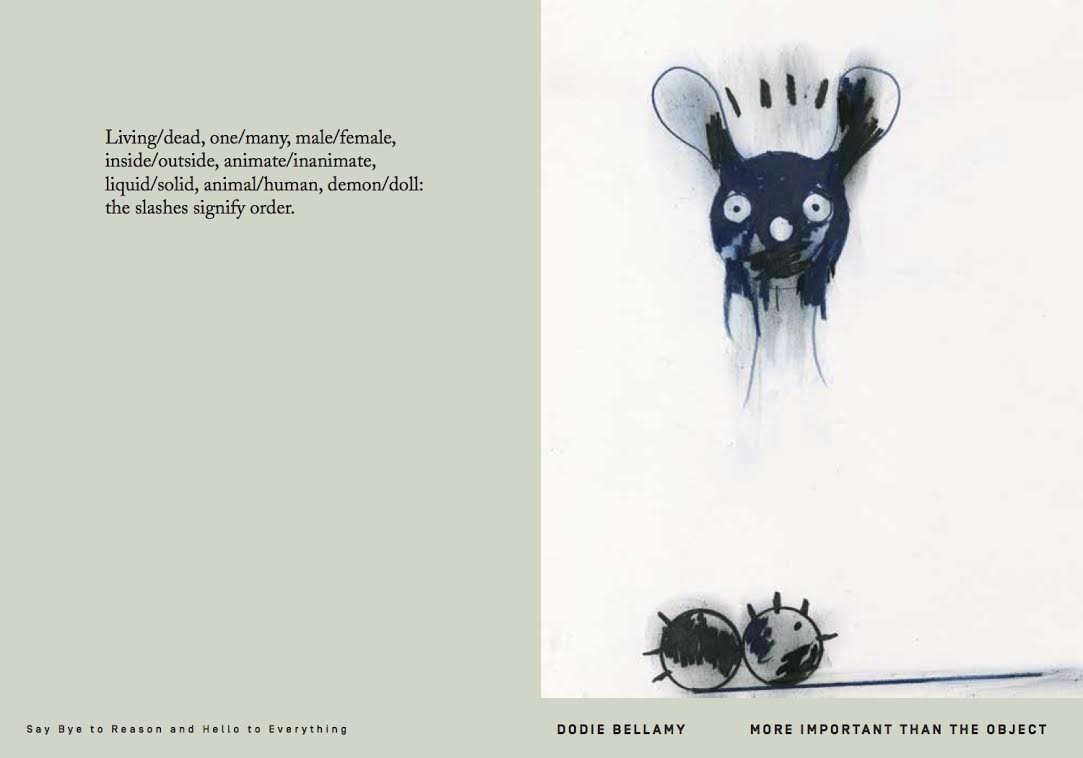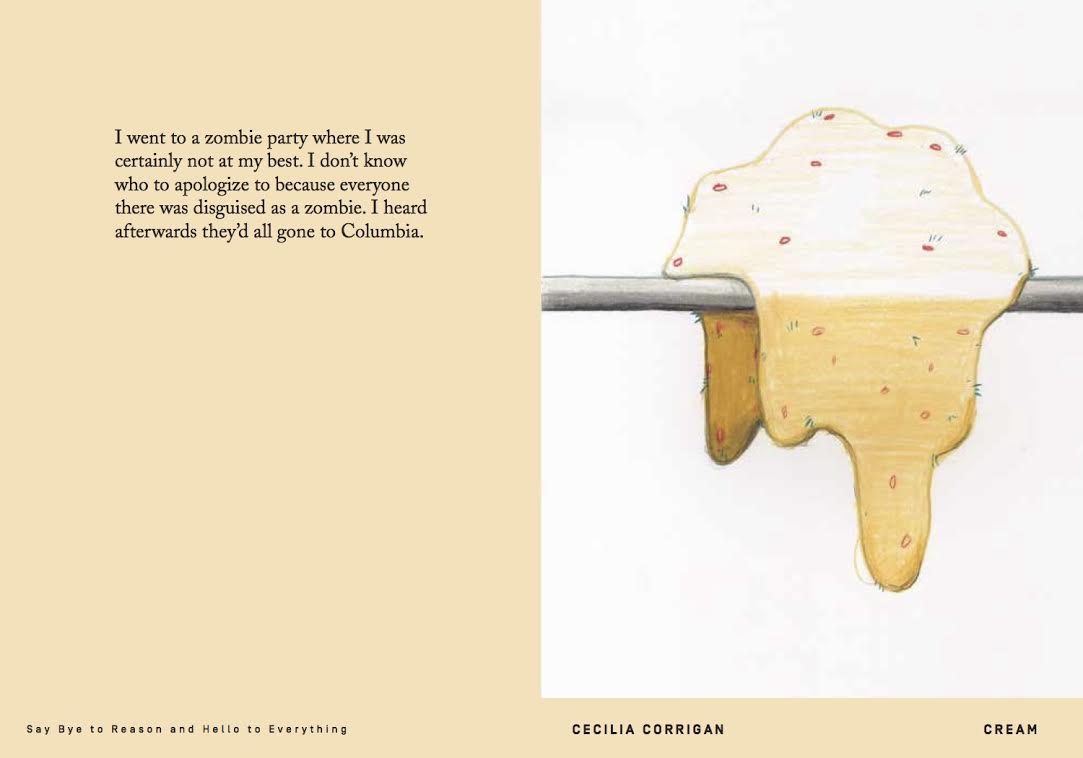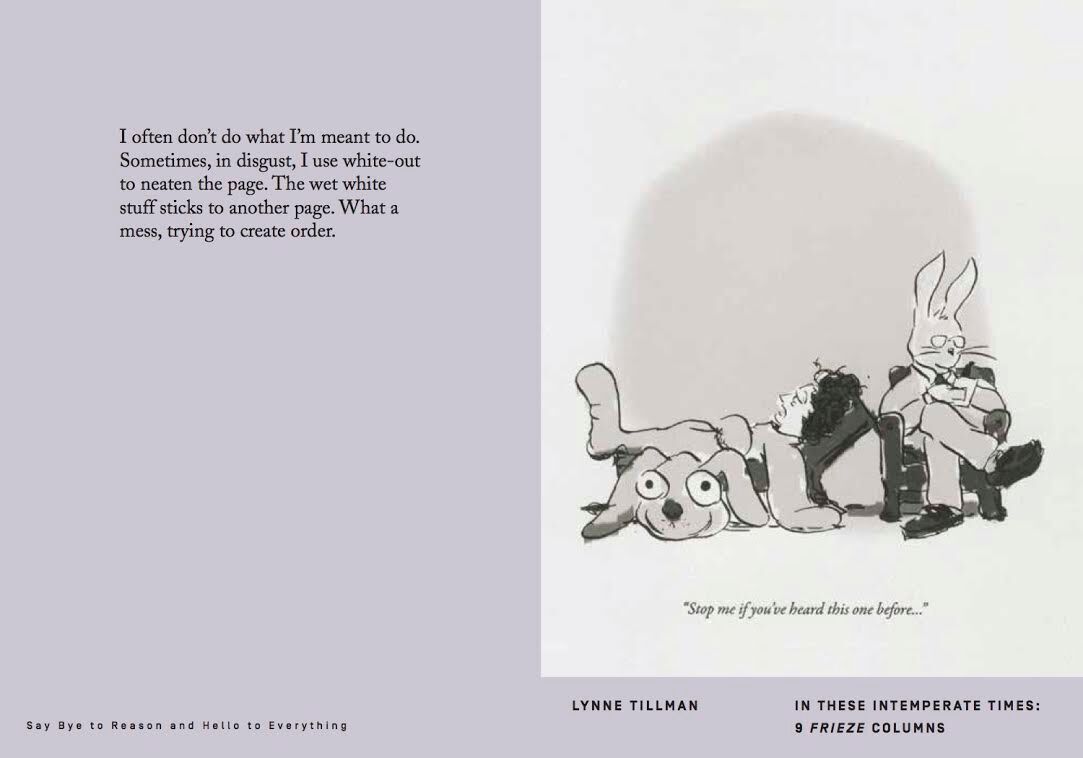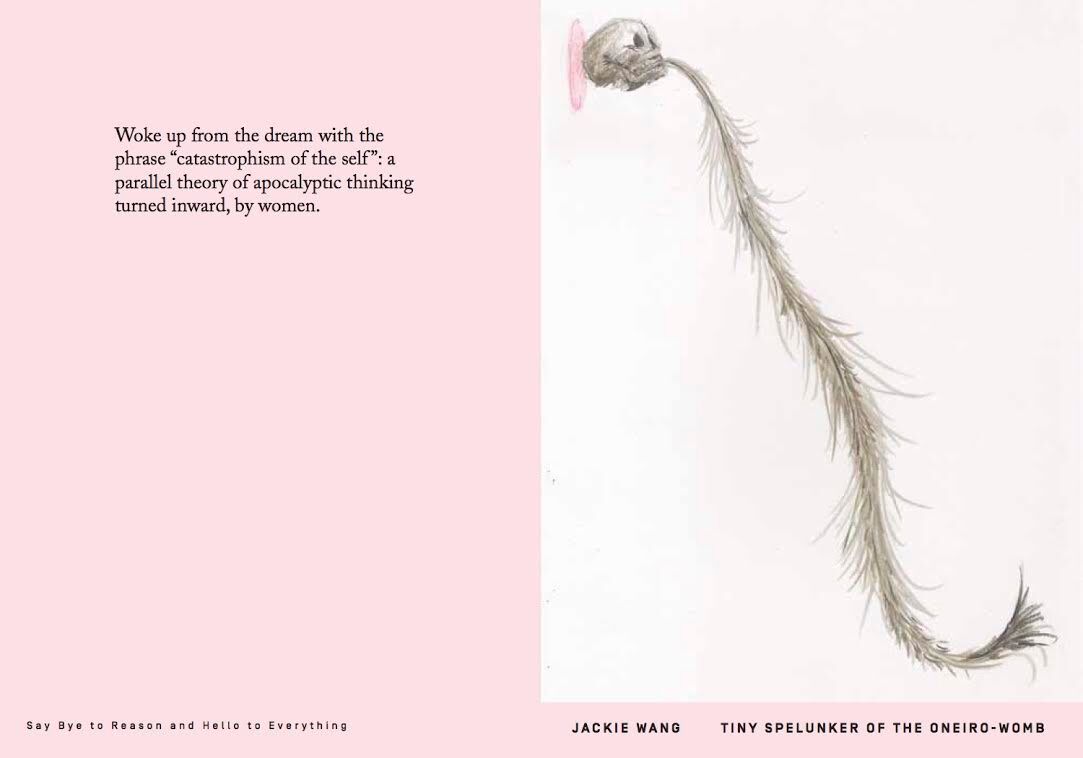Last summer, Capricious invited me to edit a book—any kind, really—for them, with the lone stipulation that it be “literary,” whatever that might mean. Founded in 2004, Capricious is best known for its feminist and queer art books, including zines like Girls Like Us and Randy; K8 Hardy’s collaged fashion book, Frank Peter John Dick; Eve Fowler’s collection of photographs of Los Angeles sex workers from the 1990s, Hustlers; and Matt Keegan’s box of art objects, ==. I was excited to add to this important legacy and invited five writers—Dodie Bellamy, Cecilia Corrigan, Amy De’Ath, Lynne Tillman, Jackie Wang—to each contribute a short book of new or previously uncollected material. They all agreed. I also invited the artist Nayland Blake to do the covers for each book as well as the box they would be packaged in, and he generously let me spend a day at his apartment in Crown Heights going through his archive of drawings. One in particular—a network of colorful, dashed-off squiggles above two quacking, furious little ducks—struck me, likely because it was the only one with text: Say bye to reason and hi to everything—a canny idea that gave shape to the overall project. I choose it as the cover of the collection and the title.
While each book retools a different genre (poetry, criticism, memoir, the dramatic monologue, the journal), a few themes emerged among the books, though the most prominent is the desire to make sense of ourselves and the categories that define us: “Living/dead, one/many, male/female, inside/outside, animate/inanimate, liquid/solid, animal/human, demon/doll: the slashes signify order,” Dodie Bellamy writes in her book More Important than the Object, which reconsiders the work of Chantal Ackerman and Jay Defeo. On a similar note, Tillman observes in her collection, In These Intemperate Times, a collection of recent essays for the British art magazine Frieze: “I often don’t do what I’m meant to do. Sometimes, in disgust, I use white-out to neaten the page. The wet white stuff sticks to another page. What a mess, trying to create order.” The stickiness of the page, whited out or covered in ink, and the necessary jumble it implies: this, the disorder of things, is what these five writers concern themselves with, obsessively, ambivalently, dreamily, directly, pick your adverb. Then say hi to everything.
–Andrew Durbin

from “A POETICS OF BOUNDARY ISSUES”
As I write this I listen to my radio: rap at the door, a cop in the threshold holding a battered bicycle helmet, the mother clenches “my baby!” “he’s all right, ma’am, because he was wearing this” bicycle helmet saves teenage head then John Cougar Mellencamp “it’s time to go home and I ain’t even done with the night” then “there ain’t no breakman on this train; there ain’t no engineer to pull that throttle back” then “this portion of K-Fog’s Super Alphabet Weekend is brought to you by the letter A” (echoes: A-A-A-A-A-A-A-A) then that drecky “Aja” song by Steely Dan then now that your brain is paying attention I’m going to ask it to think about something unpleasant: a severe side-impact automobile collision BMW HEAD CUSHIONING saves owner’s head. Two head-wrecks in half an hour! Oddly, I never think much about my brains being smashed steel penetrates mushy mass and you can never enjoy opera again but my radio, a handsome blue Sony, tells me I am a fool. Vegetarian Times is tossed on the bed beside me, I swivel my head to the right and stare vacantly at an ad for a calcium supplement. “Don’t forget the eight bones of your cranium,” it reads. “They need to be strong to help protect that lovely gray matter of yours (the very same gray matter that’s imagining your future right now).” I ponder the skull’s fragility. How did I ever make it to middle age? On that brittle edge where the bone china dome threatens to implode my writing begins.
Living/dead, one/many, male/female, inside/outside, animate/inanimate, liquid/solid, animal/human, demon/doll: the slashes signify order. A on the left/B on the right. And never the twain shall meet. The slashes are a membrane, a dimension, the balcony in Romeo and Juliet, a locked iron door. The slashes are very weak and when they get leapt over or penetrated we, the Western Civilizationers, are filled with fascination and dread day becomes night in these dank crannies categories get messy and up sprouts radical otherness, horror, taboo poisonous mushrooms with big red spots when does the TV end and the world begin? The power of dejecta: shit, hair, pus, urine, skin flakes, snot, fingernail parings, DNA that lingers in the fibers of a bloody glove: it came from me but is not me. Or is it? Drip happens. During orgasm the slashes turn into blades. Very dangerous. We don’t have enough hands at any given moment to cover all the holes in our bodies, those gaps where things come in, things come out. A woman’s face is ripped from her head by hooks, it hangs in the air wobbly and frail as her panties a disruption of top/bottom she is comparable to Van Gogh in that she’s a totally different species. Do you? Am I? The lover’s skin, the lover’s acres of skin, no matter how hard you rub against it you will never as Jim Morrison aptly put it “break on through to the other side.” But would you want to if you could, would you really?
Dodie Bellamy is an American novelist, nonfiction author, journalist and editor who writes genre-bending works that focus on sexuality, politics, and narrative experimentation, challenging the distinctions between fiction, essay, and poetry. Her methods include radical feminist revisions of canonical works. Bellamy is one of the originators in the New Narrative literary movement of the early and mid 1980s, which attempts to use the tools of experimental fiction and critical theory and apply them to narrative storytelling. Bellamy also directed the San Francisco writing lab, Small Press Traffic. She teaches creative writing at San Francisco State University and California College of the Arts.

How’s that, El Gato? I asked.
I wish you wouldn’t call me that, said El Gato
Sorry El G, I said.
But do go on! said CB2.
Yeah babe, said CB1, interested.
Well you see, said El Gato.
Prescription formulas contain retinoic acid, the magic ingredient that fights visible
aging. Nonprescription alternatives need to be converted into retinoic acid by the
skin at the cellular level. In off-the-shelf formulas, the ingredient called retinol is
the only derivative of vitamin A worth using.
Did I tell you I started that book you mentioned?
said one of us to another one of us
There’s a lot of literature showing that while retinol is more gentle than retinoic
acid, biochemically it does exactly the same thing—it may just take longer to see
results.
El Gato continued,
The same can’t be said for the derivatives called pro-retinols (a.k.a. retinyl
palmitate, retinyl acetate, and retinyl linoleate), which are the most gentle—but
weaker, too. Of the formulas shown here, Retin-A requires a prescription, but the
others are available over the counter: Biopelle, Retriderm Serum and so on.
What did you think of––
CB1 almost said
Something like Olay Pro-X Deep Wrinkle Treatment has retinyl propionate, a less
irritating form of vitamin A. There’s often peeling and redness, but that’s a side
effect of the irritation—not a true and even exfoliation, like the one you get from
an ingredient like glycolic acid.
Are we out of beer?
asked someone,
Might be, CB1 said.
I’ll check, said someone,
fleeing to the kitchen.
Anyway,
El Gato explained,
the peeling is certainly not why people start looking
better. In fact, it’s why most people give it up. Retinoids work at a much more
profound level by affecting gene expression
and causing enhanced collagen production, skin smoothing,
and evening out of pigmentation.
Can you grab some Stella?
Sure! said the beer fetcher.
It’s true that retinoids break down in sunlight,
El Gato elaborated,
Which is why they are bottled in opaque packaging and are still best worn at night—
to make sure they aren’t rendered inactive. However, they do not make the skin more
prone to sunburn. That misconception came about because in some early studies,
people described putting on a retinoid, walking into the sun, and immediately
burning. But that redness is likely related to heat exposure. That’s solely related to
your skin’s chemistry and retinoid receptors. The words ‘sensitive skin’ on a label are
often code for a low concentration of active ingredients. However, dermatologists
still recommend them because these lower concentrations (and soothing
supplemental ingredients) make them the perfect gateway retinoid. Once a patient
with sensitive skin has tolerated a tube of that over a period of several weeks, we can
then graduate them to a stronger retinoid knowing the skin cells are now better
adapted to handle it. A change in climate won’t suddenly make your skin react to a
retinoid you were tolerating a few days earlier at home. Once skin cells have adapted
to the strength of the retinoid you’re applying, any irritation (called retinoid
dermatitis) generally stops. It’s unlikely to flare up again until you switch to
something stronger.
Still, if you’re jumping on a long-haul flight or going skiing, it’s a good idea to layer
a heavier moisturizer over your retinoid to avoid dryness, which makes skin more
susceptible to irritation in general. We’re still processing the fact that retinoids don’t
increase your risk of sunburn, too. But get this: Combining retinoids with island
hopping may even be a good thing. They not only boost collagen production, but
may also have the potential to stop photo-aging before it starts. They’ve been shown
to prevent the rise of collagenase—the enzyme that breaks down collagen—after UV
exposure. Not only can you, you really should—that’s where most of the damage
shows up. Studies have shown that people who apply retinoids right up to the eyes
get the best results. Ready to take off, babe?
Ok, sure, said CB1. She had bitten off all her nail polish, and whispered,
I think I just ate some of my nail polish.
Cecilia Corrigan is a writer and performer. She recently starred in the short film Crush, which she co-wrote with director Katherine Bernard, now streaming at Dazed Magazine. She was recently selected as one of Issue Project Room’s Artists in Residence for 2016-17. Her first full-length book, Titanic, won the Plonsker Prize and the chapbook True Beige, (Trafficker Press). She is completing her PhD in Comparative Literature at NYU, writing about social media, makeup, and comedy. Her fiction and essays have been published many places including n+1,Joyland, and Nerve.

Unconditional
for Andrea Brady
Making him happy driving up to the
promontory where millionaires live, struck
by the good fortune of ice cream
and petrol. Sit under a palm and think
totality. Justice in your cheeks.
Making you happy but not really,
angry and hungry eating a bird salad
take a picture of me swimming
naked at this point I said look
But you don’t care. There’s a ladybird
crawling across the windscreen who
says it’s a man. Who says a man
wields power everybody does. I do.
Condominiums and condoms are the
same thing we all know that.
Nothing has happened to us since owning
a house and a car and a terracotta elephant
you know the world belongs to you.
If you touch a fire you get burned.
If babies are hungry, they cry.
What’s a working-class poem, is it
always bitter foam or can it be just a shrug
does it lack self-reflexivity or shy away
from natural light, in Gaza they said
they were going to live right
through us and I thought they meant
spiritually: I tried to collect the working-
class but I found they had run from
themselves in all directions. I found
they were only my legs against all the wind
in the world, muscle that knowing at all
took possession of nothing, and then
we were all jobless on the back slope,
simple and depopulated.
Amy De’Ath’s poetry chapbooks include Lower Parallel (Barque 2014), Caribou (Bad Press 2011), and Erec & Enide (Salt 2010). With Fred Wah, she is the editor of a poetics anthology, Toward. Some. Air. (Banff Centre Press 2015). Her criticism has appeared in Women: A Cultural Review, Anguish Language (Archive Books 2015), and Cambridge Literary Review, and is forthcoming in After Objectvism: Reconfiguring 21st-Century Poetry and Poetics (U of Iowa P 2017). She is a PhD Candidate at Simon Fraser University and lives in Vancouver, on unceded Coast Salish Territories.
.

from “O.T.T.”
Theodor Adorno wrote: “Today only exaggeration per se can be the medium for truth.” Likely, he was recalling the hideous effectiveness of Nazi propaganda, fostered by Joseph Goebbels. Now, sweeping pronouncements do provoke attention. TV’s talking heads—whatever their politics—bark like scared dogs, to alarm their faithful. These speakers exaggerate with affect, vocal emphases and gestures called “color.” Repetition, which Goebbels relied on because it worked, still works. Seen that way, Gertrude Stein’s “Rose is a rose is a rose is a rose” shows that naming the world of things is more worrying.
In the arts, exaggeration appears as, “So-and-so is the most important artist,” or “X is the greatest writer of the 20th century.” A person I admire told me they thought Samuel Beckett was, and I thought, quite ordinarily: Franz Kafka? Virginia Woolf? But I said aloud, “Why does it matter?” Remember the game: Which ten books would you take to a desert island? What a question. People create weird problems for themselves. People also easily count to ten and hold ten names in memory. But to hold one thought in mind that contradicts another valid and powerful one, that’s a more unusual, even dangerous proposition. It makes political decisions and ethical judgments achingly complex. Reducing choice—about websites, movies, books, blogs, etc.—is functional, because of the plethora of stuff. Also, holding principles, which appears worthy, reduces choice: acting on principle, you don’t have to think.
People want order in their lives and declare stuff worthless. That rejectamenta often comes on an end-of-the-year list. I don’t make those lists, but do imagine, at year’s end, a different life, forever called a simple life, which no one leads. In mine, I live near the ocean and, every morning, I walk to a boardwalk or sit at a café and see, in the distance, the ever-tantalizing horizon. Soon I might try to see in front of me, like the ocean, my bookshelves. Each book sits, spine out, so I can find it at a glance. Content, I imaginatively move to my desk, where everything has its place (a wonderful image, “everything has its place”). I’m told visualizing helps, but the ability to form a picture, in an “image-glutted” culture, comes too easily.
I read my diary of the year, but it isn’t a real diary, just a Filofax where I’ve written what I need to do, which events to attend and occasional notes. Many crossings-out and black “X”s darken the pages: I often don’t do what I’m meant to do. Sometimes, in disgust, I use white-out to neaten the page. The wet white stuff sticks to another page. What a mess, trying to create order.
Lynne Tillman is a novelist, short story writer and critic. Her most recent collection of essays What Would Lynne Tillman Do? was a finalist for the National Book Critics Circle Award in Criticism (2014). Her most recent novel is American Genius, A Comedy (2006), on The Millions’ list of Best Novels So Far in the Millennium. Tillman writes frequently for artists books and catalogues, and has a bimonthly column in Frieze art magazine. In fall 2016, Semiotext(e) will publish hernew collection of fiction, The Complete Madame Realism and Other Stories. She is currently finishing a novel, Men and Apparitions, due to be pubbed in 2017.

THE SMARTCITY
In the dream the Wise Woman lived in a cafeteria church.
Was I wandering the streets searching for my mother?
The city can’t hide its true nature from me. It looks like Las Vegas but I know the whole thing is a bureaucracy designed to give me grief.
I can’t understand the signage. Someone behind me tells me my yellow ticket has been marked for double inspection.
I run up and down a kitsch replica of an Egyptian pyramid, pathways covered in red velour carpet.
Because I am not a customer I have to go through a maze.
Why doesn’t anyone question the design of this city?
The agora of the land of dreams silently laughs at how all space become the sensation of rushing to catch an airplane.
In this world, like the waking one, the ease of your commute is determined by your class status.
But in the dream your class status is determined by an aggregate of data mined by a ticketing machine that calculates your worth on the spot.
Big Data makes the classification of humans more precise.
But in the dream the human is not privy to the algorithms or the data. Their status is never revealed to them.
All that is revealed to them is the number of inspections they must endure and hoops they must jump through to get on the train-plane.
They are left wondering if the cybernetic government has identified them as a threat, or if the inspections are arbitrary.
Jackie Wang is a writer, poet, musician, and author of Against Innocence (Semiotext(e)), as well as the zines On Being Hard Femme, Memoirs of a Queer Hapa, The Adventures of Loneberry, and The Phallic Titty Manifesto. In her critical essays she writes about queer sexuality, race, gender, the politics of writing, mixed-race identity, prisons and police, the politics of safety and innocence, and revolutionary struggles. Her blog, Ballerinas Dance with Machine Guns, reads like a journal that explores writing as process, the personal as political.



